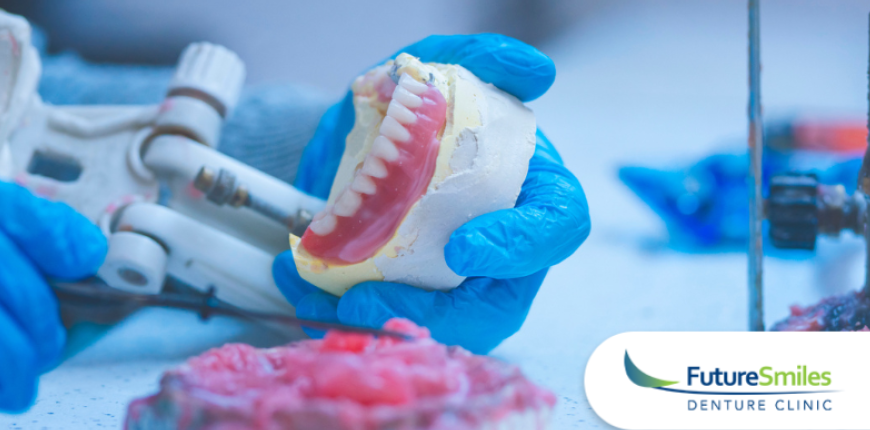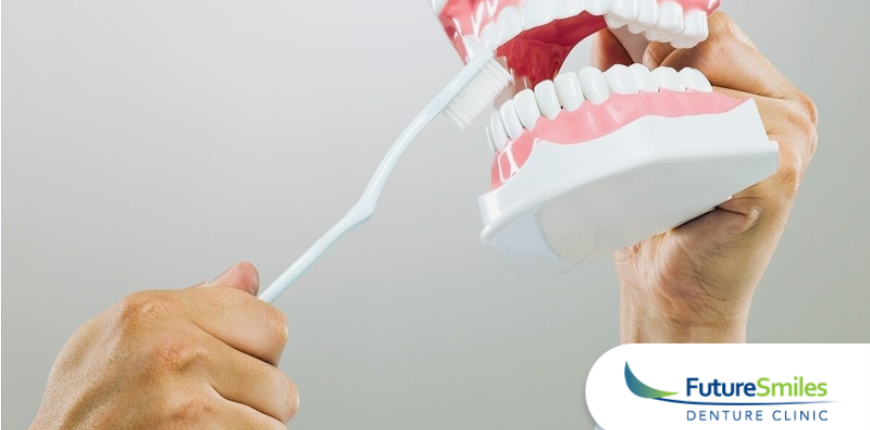Have your dentures suddenly become uncomfortable? Here's why a denture reline might be exactly what you need to fix the problem.
It can be somewhat alarming to all of a sudden experience discomfort due to your denture. You may think something is horribly amiss, but it's actually quite common to have this happen. That's because bone resorption frequently occurs in people who have had any remaining natural teeth extracted ahead of getting complete dentures.
What is bone resorption? It's a naturally occurring phenomenon that sees the bony supporting structure of your now extracted teeth be reabsorbed into your body for other purposes. Luckily, there's an easy solution to this problem that tends to take place around three to four months after your remaining teeth have been extracted. It's called a denture reline, and it can be done in one of two ways. Let's see which one might work best for you.
Get Your Free Consultation
If you need affordable dentures or denture repairs in Calgary, Future Smiles Denture Clinic has you covered. Just get in touch with our helpful denture team by calling 403-475-0016 or by booking a FREE consultation, or visiting our Coral Springs NE or Macleod SW Calgary clinics. We'd love to help get you smiling again!
How a Denture Reline Can Make Yours Comfortable Again
A denture reline is a simple and affordable procedure that should take place every five or so years. For people who have just received complete dentures after getting their remaining natural teeth extracted, they may require a denture reline around four to five months after receiving their prosthetic as bone resorption may change the shape of their mouth and gums. This resorption can result in a denture that no longer fits properly, causing the wearer pain or discomfort.
There are two main types of denture reline. Below we take a closer look at each one so you can better decide which might be best for you.
Soft Reline
A soft reline is usually the preferred option amongst denture wearers. That's because they are generally much more comfortable compared to a hard reline. They can also be accomplished within the same day in most cases, allowing the patient to not have to go without their denture for a sustained period of time. Most soft relines are carried out using a liquid polymer that the denturist will layer onto the denture to improve the cushion it provides.
The added comfort a soft reline brings with it makes it particularly popular amongst new denture wearers. One of the only disadvantages to a soft reline is that it won't last as long as a hard reline will and it may require more frequent attention.
Hard Reline
Much like a soft denture reline, a hard reline helps to reshape the denture, so it fits a patient's mouth more accurately and comfortably. The main difference is the type of material used in a hard reline, which is much more similar to the hard base of the existing denture. This leads to a more permanent solution that can last for many years.
While some hard relines can be done within the same day at your denture clinic, most denturists prefer to send the denture to a lab given the greater complexity and challenges a hard reline brings with it. This means you may be without your denture for however long it takes to get your hard reline done. The main advantage of a hard reline is that it will last for up to five years, while the main disadvantages are the time it takes to get the procedure done and a potentially less comfortable fit compared to a soft reline.
Related Reline Information:
How to Know if Your Dentures Need to Be Relined.
Do I Need a Denture Repair or Reline? What's the Difference?
A Denture Reline Can Prolong the Life of Your Denture
A denture reline is a great way to extend the life of your denture. It can also be used to fix a cracked denture in certain situations. If your denture is suddenly feeling uncomfortable, be sure to ask your denturist whether a reline can solve the problem. If comfort and practicality are your main priorities, a soft reline is probably your best choice. But if you prefer longevity and less hassle, then a hard reline may be the solution for you.
If you need a denture reline or repair in Calgary, be sure to contact us today. We offer affordable denture solutions and flexible financing options and direct billing to help Calgarians get the important denture care they need quickly and cost-effectively.
Get Your Free Consultation
If you need affordable dentures or denture repairs in Calgary, Future Smiles Denture Clinic has you covered. Just get in touch with our helpful denture team by calling 403-475-0016 or by booking a FREE consultation or by visiting our Coral Springs NE or Macleod SW Calgary clinics. We'd love to help get you smiling again!
FAQs
How long does a denture reline take?
A soft reline can take under 10 minutes, which is how long the material requires to set. A hard reline may take much longer if your denture needs to be sent to a lab for processing.
Can you reline your dentures yourself?
You can, and there are several at-home denture reline kits available for purchase out there. Obviously, we recommend having your denturist perform this important procedure so you can receive the best results possible. An at-home denture reline also won't last as long as one done by your denturist.
How many times can dentures be relined?
The answer to this question varies on the state of the denture in question. Typically a complete denture will last around 10 years, and it should be relined either once every two years if a soft reline is done and once every five years if a hard reline is carried out. That means you can get your full denture soft relined about five times and hard relined about two times.






